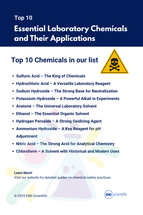Apr 8th 2025
Top 10 Essential Laboratory Chemicals and Their Applications
In scientific studies, industrial applications, and educational experiments, laboratories play a crucial role. Essential chemicals that enable many studies, reactions, and results to be done are the heart of every lab. These chemicals are used for testing, synthesis, cleaning, and preservation, among others. They can be used effectively and safely by researchers, students, and experts if they understand their uses. Ten vital lab chemicals are discussed here, and their significance in scientific endeavors.
Sulfuric Acid
Sulfuric acid is one of the most important chemical we use in the lab. H2SO4 or sulfuric acid contributes in many chemical reactions, such as pH buffering, dehydration reactions, and preparation of other compounds like fertilizers, colors and other industrial materials. H2SO4 is highly reactive, it is also used in making batteries and other industrial applications.
Hydrochloric Acid
A basic chemical in high demand in laboratory and industry is a powerful chemical, hydrochloric acid (HCl). It is used in laboratory testing, cleaning metals and adjusting pH levels. Hydrochloric acid (HCl) is used to neutralize alkaline substances, to break down organic substances and to digest samples for analysis. Because it can dissolve metal and react with bases, HCl is a necessary reagent in most experimental procedures.
Potassium Hydroxide
In laboratory use, a highly alkaline substance, potassium hydroxide(KOH) is used for pH adjustment, saponification and titrations. It can be used in making soap and detergent industry and is seen in alkaline batteries. Because of its very caustic nature, potassium hydroxide is employed to create chemical solutions for industrial and medical use.
Sodium Hydroxide
Another very strong base extensively used in labs for organic synthesis and neutralization reactions is sodium hydroxide (NaOH). This chemical is heavily used in the production of textile, paper and detergents. Sodium hydroxide (NaOH)is used to extract the various metals and purification methods, and also to analyze the acidity or alkalinity of solutions in chemistry.
This is because it is highly corrosive and can cause serious burns. It is also used in the purification of chlorine and for pickling steel. Sodium hydroxide (NaOH) is a silver crystalline substance that is highly soluble in water. Sodium hydroxide is available in pellets, flakes, and as a solution. Sodium hydroxide (NaOH) is used in the laboratory to cleanse glassware and to dissolve many organic substances. It is used in the manufacturing of soaps and detergents, and for bleaching and disinfecting purposes. Sodium hydroxide (NaOH) is employed in the processing of starch, paper, and fibers. It is also employed in the processing of petroleum jelly and in the extraction of hemp oil. Sodium hydroxide (NaOH) is utilized to raise the pH of a solution, for example, in the titration assessment.
Ethanol
Ethanol ,an alcohol, a common organic solvent, plays a crucial role in many lab procedures, from sterilization to chemical synthesis and sample preservation. It's frequently used to clean lab equipment and serves as a key ingredient in disinfectants. Truly, ethanol is one of the most versatile substances in the lab, and it's essential for various biological and pharmacological preparations.
Acetone
Acetone is the simplest form of ketone, an another key solvent often found in labs for degreasing and cleaning tools and glassware is acetone. It's a crucial part of chromatography and chemical extractions. Acetone stands out as a versatile solvent in both organic and industrial chemistry, thanks to its impressive range of dissolving capabilities.
Hydrogen Peroxide
Hydrogen peroxide (H₂O₂) is a well-known oxidizing agent celebrated for its strong bleaching and disinfecting abilities. H₂O₂ in laboratories, it plays a crucial role in various analytical procedures, chemical synthesis, and sterilization processes. Thanks to H₂O₂ oxidizing properties, it's also valuable in forensic science and environmental analysis, helping to detect tiny amounts of chemicals.
Ammonium Hydroxide
NH4OH is One of the go-to reagents in many chemical reactions and for qualitative analysis in labs is ammonium hydroxide (NH4OH), which is basically a water solution of ammonia. It's crucial for making polymers, drugs, and fertilizers. Plus, NH4OH serves as a handy neutralizing agent since it can react with acids to create ammonium salts.
Nitric Acid
HNO3 is another powerful acid that finds its way into a variety of fields like metallurgy, analytical chemistry, and the making of fertilizers and explosives. HNO3 is commonly used for producing nitrates, purifying metals, and etching surfaces. Thanks to its strong oxidizing properties, nitric acid is a go-to in laboratories for testing metals and other materials.
Distilled Water
Lastly, one of the most basic yet crucial materials you'll find in any lab is distilled water. It plays a vital role as a medium, reagent, and solvent in various chemical processes. Because distilled water is free from ions and impurities, it’s absolutely essential for research that demands precise and clean conditions. It’s commonly used as a standard in most analytical methods and is key for preparing solutions and cleaning equipment in laboratories.
Each of these lab chemicals serves a specific purpose in both industrial and scientific processes. They’re used in everything from environmental monitoring and sterilization to chemical manufacturing and analytical testing. Ensuring proper laboratory safety and achieving accurate experimental results depend on how well these substances are handled and stored. By understanding their characteristics and applications, scientists and researchers can significantly enhance their lab work and contribute to a wide array of scientific fields. These fundamental compounds remain the backbone of laboratory activities, fueling advancements in science and technology, whether in universities, research institutions, or industry.
Visit ENG Scientific to explore high-quality chemical solutions and expert guidance for your laboratory needs.

